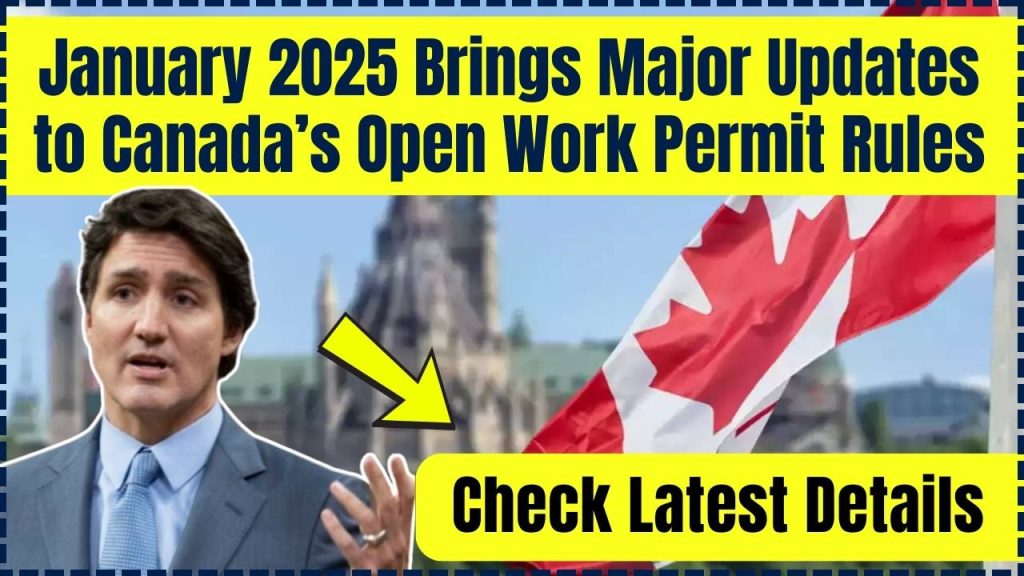Canada’s Open Work Permit Rules: Canada has announced significant updates to its Open Work Permit (OWP) rules, effective January 2025. These changes aim to align immigration policies with the country’s labor market needs, ensuring a more streamlined and purposeful system for workers and their families.

Whether you’re an international student, foreign worker, or a family member of someone in Canada, these updates could directly impact your eligibility for open work permits. Let’s break down the changes and what they mean for you in a simple yet detailed manner.
Canada’s Open Work Permit Rules
| Aspect | New Updates |
|---|---|
| Eligibility for Spouses | Limited to spouses of students in Master’s or Ph.D. programs and workers in TEER 0-3 occupations |
| Validity Requirements | Principal applicant must have at least 16 months left on their permit |
| Dependent Children | No longer eligible for family OWPs |
| Sectors in Focus | Priority given to healthcare, construction, education, and natural sciences |
| Transitioning Programs | Work permits issued under older rules remain valid until their expiration |
The January 2025 updates to Canada’s Open Work Permit rules mark a pivotal shift in the country’s immigration strategy. While these changes narrow eligibility, they also aim to better address labor market gaps and economic priorities. If you’re affected by these changes, understanding the new criteria and preparing a thorough application can make all the difference.
Why These Changes Are Happening
Canada’s new policies reflect a growing need to manage temporary residents and address key challenges such as housing shortages and workforce priorities. By narrowing eligibility, the government aims to:
- Focus on high-demand occupations and skilled sectors.
- Balance economic immigration with housing availability.
- Reduce strain on urban infrastructure.
According to a 2024 report, Canada issued over 700,000 open work permits in the past year, a number that’s expected to decline under these tighter regulations.
These policy shifts are part of a broader effort to ensure immigration supports Canada’s long-term economic stability. A report from Statistics Canada in 2024 highlighted that nearly 1 in 4 jobs in sectors like healthcare, construction, and education faced chronic shortages, underscoring the importance of targeted immigration reforms.
What’s Changing for Different Groups
1. Spouses of International Students
If you’re the spouse of an international student, eligibility for an OWP is now limited to specific academic programs. These include:
- Master’s Programs: Only those lasting 16 months or more.
- Doctoral Programs: All Ph.D. programs remain eligible.
- Professional Programs: Select fields like medicine, law, and engineering.
Example:
Anna’s husband is enrolled in a two-year Master’s program in Canada. She is eligible to apply for an open work permit under the new rules. However, if he were pursuing a one-year diploma program, she would no longer qualify.
Why This Matters:
The government’s focus on longer and advanced programs aligns with the demand for highly skilled workers. By prioritizing spouses of students in advanced fields, Canada ensures that families of future professionals can contribute to the economy.
2. Spouses of Foreign Workers
For spouses of foreign workers, eligibility hinges on the primary applicant’s occupation under the updated TEER classification system:
- TEER 0 (Management)
- TEER 1 (Professional)
- Select TEER 2 or 3 occupations, especially in high-demand sectors such as:
- Healthcare: Nurses, medical technologists, and caregivers.
- Construction: Electricians, plumbers, and heavy equipment operators.
- Education: Teachers, academic assistants, and early childhood educators.
Work Permit Validity Requirements:
The principal applicant must have at least 16 months left on their work permit at the time of application.
Example:
John works as a software engineer (TEER 1) in Canada and holds a three-year work permit. His spouse, Lisa, is eligible for an open work permit because his occupation qualifies under the updated rules. However, if John’s permit had only 10 months left, Lisa would no longer qualify.
Impact on Key Sectors:
This policy ensures that family members of foreign workers in critical industries can integrate into the workforce, helping to address shortages in priority fields.
3. Dependent Children
Dependent children are no longer eligible for open work permits under family reunification pathways. While this may disappoint many, alternative options such as study permits or sponsorship programs remain available.
Example:
Mark and his family moved to Canada in 2023 under a work permit. Previously, his teenage son could apply for an open work permit. Under the new rules, his son will now need a study permit to continue his education in Canada.
Alternative Pathways:
Children may still benefit from programs designed to fast-track permanent residency for families, or they can explore independent immigration streams upon reaching adulthood.
How to Apply Under the New Rules
Step-by-Step Guide
- Check Eligibility:
- Verify if the principal applicant’s occupation or academic program qualifies under the new guidelines.
- Gather Documents:
- Proof of relationship (marriage certificate, shared residency).
- Valid work or study permit of the principal applicant.
- Additional documents like proof of employment (for workers) or enrollment (for students).
- Submit Application Online:
- Use the official IRCC portal to apply.
- Ensure all required forms and fees are completed accurately.
- Monitor Application Status:
- Track your application through the IRCC account.
- Be prepared for additional documentation requests.
Tips for a Successful Application:
- Double-check all forms for accuracy before submission.
- Use a professional translator for documents not in English or French.
- Submit your application well in advance of any permit expiry dates.
Impact on Existing Permit Holders
If you already hold an open work permit, you won’t be affected by the changes until your permit expires. Renewals may still be possible if:
- The principal applicant’s work or study permit remains valid.
- Renewal applications meet the criteria outlined in the updated rules.
Proactive Measures:
Existing permit holders are encouraged to review their documentation and consult with immigration professionals to explore renewal or transition options as needed.
2025 National Taiwan University Scholarships Open for September Round 2 – Don’t Miss Your Chance!
FAQs About Canada’s Open Work Permit Rules
1. What is an Open Work Permit?
An Open Work Permit allows you to work for any employer in Canada without needing a specific job offer.
2. How long does it take to process an OWP application?
Processing times vary but typically range from 4 to 12 weeks. Check current timelines here.
3. Are there exceptions to the new rules?
Yes, spouses of workers covered by free-trade agreements or transitioning to permanent residence may still qualify under previous policies.
4. What options do dependent children have now?
Dependent children can explore study permits or apply for work permits independently under eligible programs.
5. Can I renew my permit under the old rules?
If your current permit was issued before January 2025, you may still be eligible to renew it under previous criteria as long as the principal applicant’s status remains valid.











